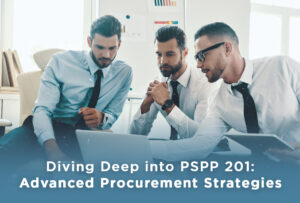
Blogs

Author: The Procurement School
Navigating the complexities of public sector organizations, procurement stands out as a cornerstone of operational success. It’s a domain where accuracy, specialized knowledge, and strategic foresight are essential. In this context, the expertise of a procurement consultant is not just beneficial; it’s a critical component for achieving efficiency and effectiveness.
The evolving dynamics of public sector procurement have increased the demand for specialized procurement consultant companies. These experts are more than facilitators; they are critical players in ensuring that every investment contributes to the organization’s goals.
Selecting the right public procurement consultant is a crucial decision. It involves carefully considering the consultant’s grasp of public sector intricacies, proven track record, and capability to provide customized solutions. This choice is about finding a partner who aligns their expertise with your organization’s specific challenges and objectives, guiding you towards enhanced value and performance. This blog will discuss factors to consider when choosing a procurement consultant for your public sector organization.
Identifying Your Organization’s Procurement Needs
At The Procurement School, we understand that every public sector entity has unique procurement challenges. Whether managing complex contracts or navigating the intricacies of government procurement policies, the right procurement consultant can make a significant difference. Identifying these specific challenges is the first step in finding a consultant to tailor their procurement services to meet your unique needs.
Aligning a procurement consultant’s expertise with your organization’s specific needs. Public sector procurement consultants bring a wealth of knowledge and experience, but their skills must match your organization’s objectives. Whether a large-scale procurement project or a more focused task, the right consultant will bring expertise and a deep understanding of public sector nuances.
Evaluating Consultant Credentials and Experience
Qualifications and certifications speak volumes. In public procurement, these credentials are not just letters after a name but a testament to a consultant’s dedication and expertise. As a leading provider of procurement education, The Procurement School emphasizes the importance of choosing a sourcing and procurement consultant with theoretical knowledge and practical, hands-on experience.
A consultant’s track record in public sector projects is a reliable indicator of their capability. When evaluating procurement consultant companies, look for those with a history of successful projects like yours. This experience ensures that the consultant is well-versed in the unique challenges and opportunities of the public sector.
Understanding Public Sector Procurement Policies
In-depth knowledge of public sector procurement laws and regulations is non-negotiable. A competent public procurement consultant will be familiar with these laws and stay abreast of the latest changes and how they impact your organization. This expertise is crucial for navigating the complex public sector procurement regulatory environment.
An essential skill for any procurement consultant in the public sector is the ability to navigate complex regulatory environments. This skill goes beyond mere knowledge of laws and regulations; it involves practical experience in dealing with bureaucratic challenges and ensuring compliance in every aspect of procurement. A consultant skilled in this area can be a valuable asset to your organization, helping to avoid legal pitfalls and streamline procurement processes.
Analyzing the Consultant’s Methodology and Approach
The strategic approach of a procurement consultant is a critical determinant in the success of public sector procurement projects. At The Procurement School, we emphasize the importance of a consultant’s strategy in transforming procurement processes. A strategic-minded consultant aligns procurement practices with the overarching goals of an organization, a vital aspect in the public sector where decisions have widespread implications.
Scrutinizing procurement consultant companies‘ methods for efficiency, transparency, and compliance is essential in public sector procurement. These consultants must demonstrate that their processes are effective, transparent, and compliant with public sector procurement regulations. Our training at The Procurement School prepares consultants to excel in these areas, ensuring regulatory compliance while achieving optimal results.
Communication and Collaboration Skills
Effective communication is a fundamental pillar in public sector procurement. Sourcing and procurement consultants must possess the ability to communicate clearly and effectively, a critical component of successful procurement management. At The Procurement School, we focus on developing strong communication skills in our consultants, ensuring they can convey critical information and align various stakeholders’ objectives.
The capability of a public procurement consultant to work effectively with diverse teams and stakeholders is crucial. Public sector projects often involve various stakeholders, each contributing their unique perspective. A skilled public procurement consultant navigates this diversity, fostering unity and collaboration toward shared goals. At The Procurement School, we prioritize cultivating this ability, preparing our consultants to handle the dynamic nature of public sector procurement.
Considering the Consultant’s Network and Resources
At The Procurement School, we recognize the significant role a procurement consultant’s professional network plays in enhancing your procurement process. A procurement consultant with a strong network brings invaluable resources, insights, and opportunities. This extensive network particularly benefits public sector organizations, offering access to various vendors, industry best practices, and innovative procurement strategies. Leveraging these connections enables organizations to navigate the complexities of procurement more effectively.
A top-tier procurement consultant offers more than just advice; they bring resources and tools to transform your procurement processes. These can include advanced software for efficient sourcing and procurement and analytical tools for deeper insights into spending patterns and vendor performance. At The Procurement School, we emphasize the importance of these tools in enhancing the capabilities of public sector procurement consultants, ensuring they deliver comprehensive and effective procurement services.
Cost vs. Value Analysis
Understanding the cost structure when hiring a procurement consultant is crucial for your public-sector organization. It is advised to investigate what the cost encompasses properly. Does it include ongoing support or additional charges for specific resources or tools? Grasping these details is vital to making an informed decision and ensuring that the services align with your organization’s budget and procurement objectives.
The value of a public procurement consultant is reflected in the long-term benefits they bring to your organization beyond immediate cost savings. This includes improved efficiency, minimized risk, and better supplier relationships. Consider the consultant’s ability to streamline procurement processes, utilize their network for advantageous deals, and implement strategies that lead to sustainable cost savings and ongoing performance enhancements.
To Conclude
The right procurement consultant plays a crucial role in enhancing the efficiency and success of public sector procurement. At The Procurement School, we recognize their expertise as essential for transforming procurement processes. These consultants ensure that every decision is informed, strategic, and practical, leading to optimal organizational outcomes.
Ready to elevate your procurement strategy?
Collaborate with leading procurement consultant companies today and let your organization achieve new heights in procurement practices.

